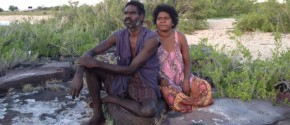I was recently told a story about a black African visitor to an Australian Indigenous community. This man went to visit an important Elder in the community. He knew that this man was a significant leader, who was important and respected. After his visit, he was reflecting with a friend of mine about how the visit had gone, whilst they were walking home. He communicated that he had been quite shocked by a number of things.
When he arrived to talk with this leader, he found him just sitting on a mat on his verandah. He looked for chairs, and then corrected himself as he realised that he needed to respect the Elder, in ‘his way of doing this’, and so joined him on the mat. It turned out that the location they were sitting in was not conducive to discussion, as there were a lot of children running around and a lot of noise. The Elder got up and indicated that they would move to a quieter location. He then moved some distance away from the house and sat on the ground there, in the dirt. The visitor was quite shocked that this leader was sitting in the dirt. Again he did not want to offend him, so he sat down beside him there, but he was very disturbed by the fact that they were sitting in the dirt. As the visitor retold this story, he pointed to the dirt beside the road and expressed with great animation “It was just like this dirt here beside the road”.
What this visitor already knew about this Elder prior to their meeting, created an expectation, a picture for him about how he thought this man should behave. We all do this. Based on our world view, we get a picture in our head about how we think something should look, according to our culture. We do it without even realising it, as we are so used to the way our culture does things, that we sometimes think that that is the only way something can be done. We may try and be respectful and go along with things, but inside we are thinking that this different way of doing things is not right or is deficient.
When we are looking in on another culture, we have to be careful that we are not mis-interpreting the situation based on our cultural world view. It could be easy to look at some people in Indigenous communities, and see them sitting in the dirt, and label this as a sign of “poverty”, “inadequacy”or “hopelessness”, because that is what it might mean in our culture. But the earth is considered something more than dirty to many Indigenous people. It is part of something precious. They may even describe it as their mother;
“The Land is my mother. Like a human mother, the land gives us protection, enjoyment, and provides for our needs – economic, social and religious. We have a human relationship with the land: Mother – daughter, son. When the land is taken from us or destroyed, we feel hurt because we belong to the land and we are part of it.”( Djiniyini Gondarra 1980 in Yule Ian R. (Ed.) My Mother the Land, Galiwin’ku, UCA)
When the visitor heard this, his perspective changed. He realised that the act of sitting in the earth could be something more than an act which made you dirty, or a sign of poor status. Many Indigenous people happily sit outside on the ground or even in the dirt, and some even prefer it to inside on a chair. This is not always the result of poverty or lack of furniture, but is a different way of life.
When we see something that does not make sense to us, or makes us feel sorry for someone or feel that there is some injustice, let us remember that we wear cultural glasses, and not make assumptions from a distance. Lets be willing to go and sit beside other people, where ever it may be that they sit, and try and understand their world, their perspectives, their hopes and their true needs. Otherwise we are at risk of judging things from appearances and just from our cultural perspective. We also have to be careful that we are not the ones deciding what the problems are and how they should be fixed. Otherwise we are at risk of making people believe that they should have a problem with things that are a natural part of their culture and something that they are free to choose to do. We are also likely to only come up with solutions that fit into our world view of how something should look.




Fergal Fleming •
An interesting story and good. I spend a lot of my life in remote parts of Uganda and there whenever you visit someone chairs are immediately produced, as is water. Providing chairs is an important social courtesy. I have also visited many communities in the NT and have happily sat on the ground – sitting on the ground in the shade of a tree is a lovely way to conduct a conversation or business.
Fergal Fleming
Darwin